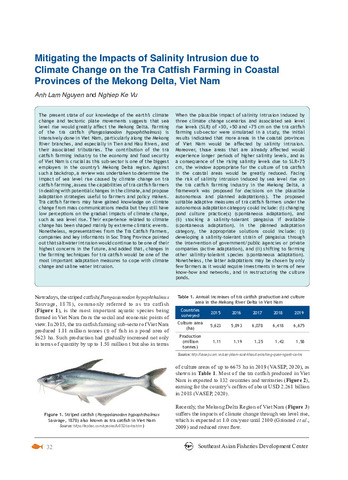Mitigating the impacts of salinity intrusion due to climate change on the tra catfish farming in coastal provinces of the Mekong Delta, Viet Nam
Share
Abstract
The present state of our knowledge of the earth’s climate change and tectonic plate movements suggests that sea level rise would greatly affect the Mekong Delta. Farming of the tra catfish (Pangasianodon hypophthalmus) is intensively done in Viet Nam, particularly along the Mekong River branches, and especially in Tien and Hau Rivers, and their associated tributaries. The contribution of the tra catfish farming industry to the economy and food security of Viet Nam is crucial as this sub-sector is one of the biggest employers in the country’s Mekong Delta region. Against such a backdrop, a review was undertaken to determine the
impact of sea level rise caused by climate change on tra catfish farming, assess the capabilities of tra catfish farmers in dealing with potential changes in the climate, and propose adaptation strategies useful to farmers and policy makers. Tra catfish farmers may have gained knowledge on climate change from mass communications media but they still have low perceptions on the gradual impacts of climate change, such as sea level rise. Their experience related to climate change has been shaped mainly by extreme climatic events. Nonetheless, representatives from the Tra Catfish Farmers, companies and key informants in Soc Trang Province pointed out that saltwater intrusion would continue to be one of their highest concerns in the future, and added that, changes in
the farming techniques for tra catfish would be one of the most important adaptation measures to cope with climate change and saline water intrusion.
When the plausible impact of salinity intrusion induced by three climate change scenarios and associated sea level rise levels (SLR) of +30, +50 and +75 cm on the tra catfish farming sub-sector were simulated in a study, the initial results indicated that more areas in the coastal provinces of Viet Nam would be affected by salinity intrusion. Moreover, those areas that are already affected would
experience longer periods of higher salinity levels, and as a consequence of the rising salinity levels due to SLR+75 cm, the window appropriate for the culture of tra catfish in the coastal areas would be greatly reduced. Facing the risk of salinity intrusion induced by sea level rise on the tra catfish farming industry in the Mekong Delta, a framework was proposed for decisions on the plausible autonomous and planned adaptation(s). The proposed suitable adaptive measures of tra catfish farmers under the
autonomous adaptation category could include: (i) changing pond culture practice(s) (spontaneous adaptation), and (ii) stocking a salinity-tolerant pangasius if available (spontaneous adaptation). In the planned adaptation category, the appropriate solutions could include: (i) developing a salinity-tolerant strain of pangasius through the intervention of government/public agencies or private companies (active adaptation), and (ii) shifting to farming other salinity-tolerant species (spontaneous adaptation). Nonetheless, the latter adaptations may be chosen by only few farmers as it would require investments in terms of new know-how and networks, and in restructuring the culture ponds.
Suggested Citation
Nguyen, A. L., & Vu, N. K. (2021). Mitigating the impacts of salinity intrusion due to climate change on the tra catfish farming in coastal provinces of the Mekong Delta, Viet Nam. Fish for the People , 19(2), 32-37. http://hdl.handle.net/20.500.12066/6688


